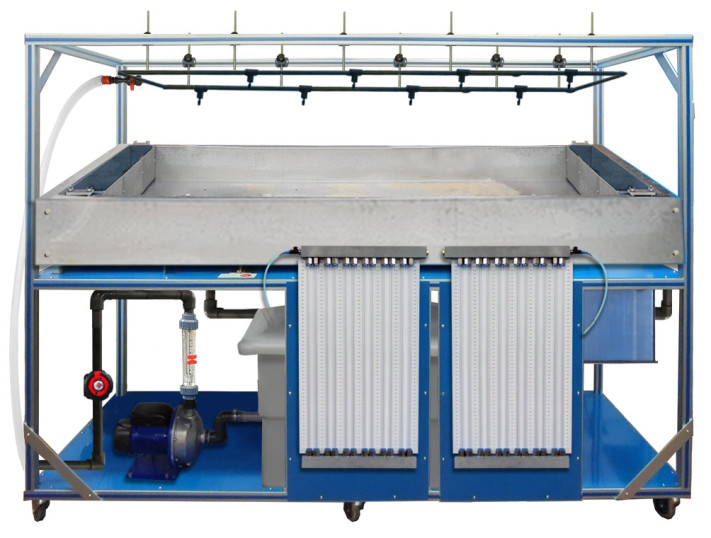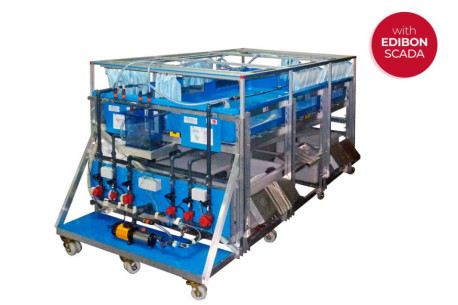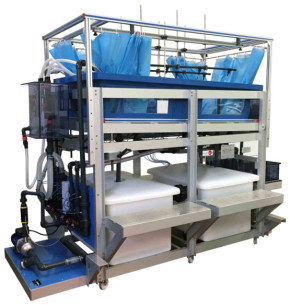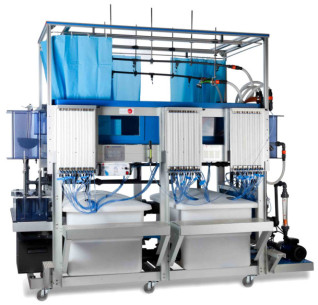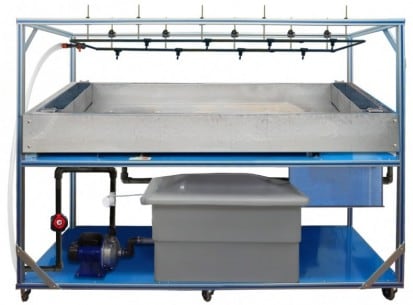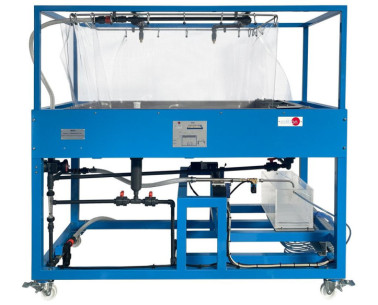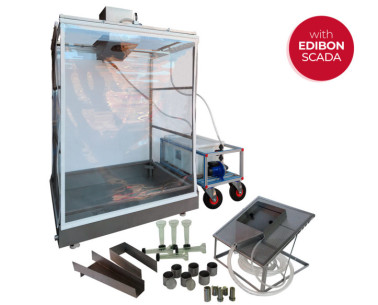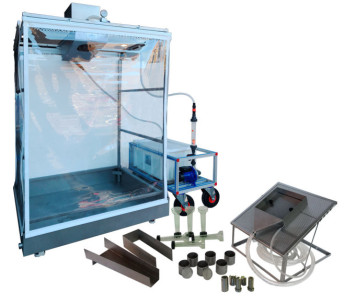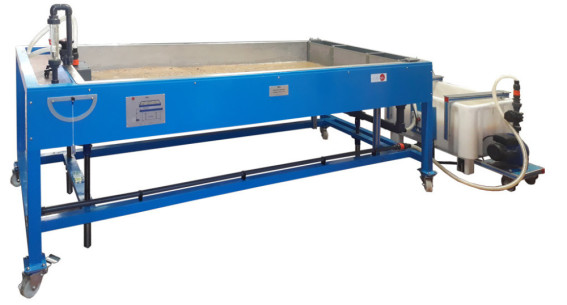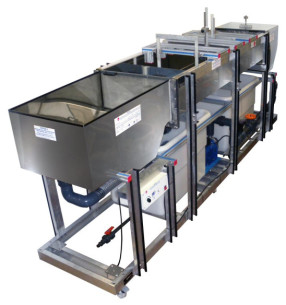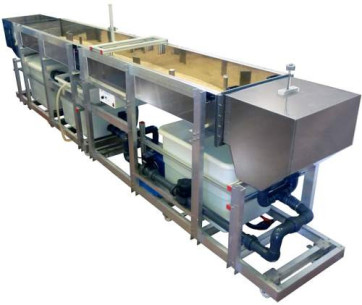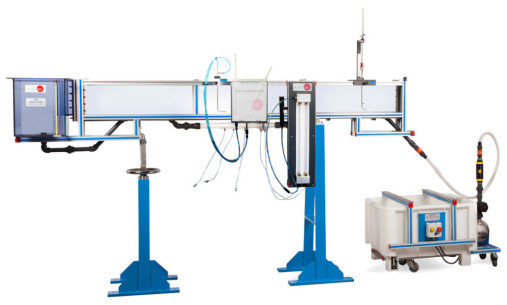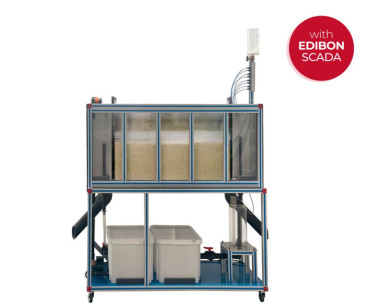Due to the growing awareness of environmental problems, not only individuals but also governments and companies have started to develop activities that tend to preserve or limit the damage to the environment. Thus, some disciplines of the environmental science, such as hydrology, hydrogeology,...
ESH(2x1m)/S Hydrologic Studies Unit
INNOVATIVE SYSTEME
The Hydrological Studies Unit, "ESH(2x1m)/S", has been designed by EDIBON to enable autonomous work in the study of water behavior within the soil. A wide variety of experiments can be conducted thanks to the specifications of the unit.
ÄHNLICHE NEUIGKEITEN
ALLGEMEINE BESCHREIBUNG
The Hydrological Studies Unit, "ESH(2x1m)/S", has been designed by EDIBON to enable autonomous work in the study of water behavior within the soil. A wide variety of experiments can be conducted thanks to the specifications of the unit.
The unit consists of a closed water circuit allowing the operation continuously or discontinuously, an important parameter when studying processes such as water level distribution around a well (stationary process) or water infiltration after precipitation (non-stationary process) using a single piece of unit. The closed circuit consists of a water tank, a computer controlled pumping, flow sensor, different flooding devices over the test area and a drainage system to recover the water.
The main element of the unit is a stainless steel test tank that can be filled with different types of sand and whose inclination can be regulated by a lifting system. The sand tank has numerous pressure taps in the lower part that allow the study of the water level with the help of pressure sensors.
In addition, water can be supplied to the test tank by different precipitation devices consisting of: 8 adjustable valves (simulating rain), from an inlet tank (simulating a river) or from two lateral French wells (simulating groundwater).
The main advantage offered by this unit is its versatility, allowing a high number of tests to be carried out, realistically simulating a soil with a very reduced space occupation and without special requirements.
ÜBUNGEN UND GEFÜHRTE PRAKTIKEN
GEFÜHRTE PRAKTISCHE ÜBUNGEN IM HANDBUCH ENTHALTEN
- Study of hydrographs as a function of the intensity and duration of the discharge.
- Study of the accumulation capacity of the soil.
- Study of soil infiltration.
- Study of a terrain flooding.
- Study of the drainage of a flooded area.
- Soil compactness study.
- Study of surface river formations.
- Study of sediment transport.
- Study of erosion in a riverbed.
- Understanding groundwater flow and water table.
- Study of the suction cone of a well.
ÄHNLICHE VERFÜGBARE GERÄTE
13.1.- HYDROLOGIE UND HYDROGEOLOGIE
ESHC(4x2m)
The main element of the unit is a test tank, which can be filled with sand. Water is supplied to the test tank through different systems: from two flexible separate hoses (simulating water inlets), from an inlet tank (simulating a river), from...
13.1.- HYDROLOGIE UND HYDROGEOLOGIE
ESHC(2x1m)
Gerät für hydrologische Systeme, Regen- Simulation und Bewässerungssysteme (2x1m), computergesteuert.
The Computer Controlled Hydrologic Systems, Rain Simulator and Irrigation Systems Unit (2x1 m), "ESHC(2x1m)", is a self-contained unit designed to demonstrate some physical processes found in hydrology and fluvial geomorphology, including:...
13.1.- HYDROLOGIE UND HYDROGEOLOGIE
ESH(2x1m)
Gerät für hydrologische Systeme, Regen- Simulation und Bewässerungssysteme (2x1m).
The Hydrological Systems, Rainfall Simulator and Irrigation Systems (2x1 m), "ESH(2x1m)", has been designed by EDIBON to demonstrate some of the physical processes encountered in hydrology and fluvial geomorphology. This includes rainfall...
13.1.- HYDROLOGIE UND HYDROGEOLOGIE
ESHC(2x1m)/S
Computer Controlled Hydrologic Studies Unit
The Computer Controlled Hydrologic Studies Unit, "ESHC(2x1m)/S", allows the work in an autonomous way for the study of the behaviorof the water inside the soil being able to carry out a wide variety of experiments thanks to the specifications of...
ERGÄNZENDE AUSRÜSTUNG
13.1.- HYDROLOGIE UND HYDROGEOLOGIE
ESHC(4x2m)
Gerät für hydrologische Systeme, Regen- Simulation und Bewässerungssysteme (4x2m), computergesteuert.
The main element of the unit is a test tank, which can be filled with sand. Water is supplied to the test tank through different systems: from two flexible separate hoses (simulating water inlets), from an inlet tank (simulating a river), from...
13.1.- HYDROLOGIE UND HYDROGEOLOGIE
ESHC(2x1m)
Gerät für hydrologische Systeme, Regen- Simulation und Bewässerungssysteme (2x1m), computergesteuert.
The Computer Controlled Hydrologic Systems, Rain Simulator and Irrigation Systems Unit (2x1 m), "ESHC(2x1m)", is a self-contained unit designed to demonstrate some physical processes found in hydrology and fluvial geomorphology, including:...
13.1.- HYDROLOGIE UND HYDROGEOLOGIE
ESH(2x1m)
Gerät für hydrologische Systeme, Regen- Simulation und Bewässerungssysteme (2x1m).
The Hydrological Systems, Rainfall Simulator and Irrigation Systems (2x1 m), "ESH(2x1m)", has been designed by EDIBON to demonstrate some of the physical processes encountered in hydrology and fluvial geomorphology. This includes rainfall...
13.1.- HYDROLOGIE UND HYDROGEOLOGIE
ESHC(2x1m)/S
Computer Controlled Hydrologic Studies Unit
The Computer Controlled Hydrologic Studies Unit, "ESHC(2x1m)/S", allows the work in an autonomous way for the study of the behaviorof the water inside the soil being able to carry out a wide variety of experiments thanks to the specifications of...
13.1.- HYDROLOGIE UND HYDROGEOLOGIE
RHU
Rainfall Hydrographs Unit
The main element of the Rainfall Hydrographs Unit,"RHU", is a tank mounted on a frame. The tank can be filled with sand. There are removable curtains to prevent splashing.There are two square pattern spray nozzles at the top that supply water to...
13.1.- HYDROLOGIE UND HYDROGEOLOGIE
RSESC
Computergesteuerte Regensimulationsanlage
The Computer Controlled Rainfall Simulator for Soil Erosion Studies, "RSESC", consists of a metal frame that can be placed directly on the ground for direct studies or used with its different accessories for laboratory tests.The entire frame is...
13.1.- HYDROLOGIE UND HYDROGEOLOGIE
RSES
Rainfall Simulator for Soil Erosion Studies
The Rainfall Simulator for Soil Erosion Studies, "RSES", consists of a metal frame that can be placed directly on the ground for direct field studies or used with its various accessories for laboratory tests. The whole structure is covered with a...
13.1.- HYDROLOGIE UND HYDROGEOLOGIE
RFS
River Flow Simulator
The River Flow Simulator, "RFS", designed by EDIBON, allows the simulation and study of the river features, included the flow and solid bed load motion.The main element is a rectangular tank made of stainless steel supported on a metal beam frame,...
13.1.- HYDROLOGIE UND HYDROGEOLOGIE
HVFLM-2
Gerät zur Visualisierung vom Fluss- und Fließbett (arbeitsabschnitt: 2000mm x 610mm)
The Mobile Bed and Flow Visualization Unit (working section: 2000x610 mm), "HVFLM-2", may be used mainly in two study fields. The first one is the investigation of mobile beds, which are related to water courses and civil engineering structures....
13.1.- HYDROLOGIE UND HYDROGEOLOGIE
HVFLM-4
Gerät zur Visualisierung vom Fluss- und Fließbett (arbeitsabschnitt: 4000mm x 610mm).
The Mobile Bed and Flow Visualization Unit (working section: 4000 x 610 mm), "HVFLM-4", may be used mainly in two study fields. The first one is the investigation of mobile beds, which are related to water courses and civil engineering structures....
13.1.- HYDROLOGIE UND HYDROGEOLOGIE
CAS
Ablagerungen im offenen Kanal.
The Sediment Transport Demonstration Channel, "CAS", designed by EDIBON, consist of an inclinable channel mounted on a base plate, supported by two supports, with a discharge tank and recirculating pump. This tank is in the Basic Hydraulic Feed...
11.1.11.- FILTRATION, SEDIMENTATION AND MIXING
PDFDC
Drainage- und Sickerwassertank, computergesteuert.
This unit has been designed for the practical demonstration, visualization and experimental study of the flow through permeable media and flows in subsoil.The unit basically consist of a tank (soils container) to contain the sand, lower water...
QUALITÄT
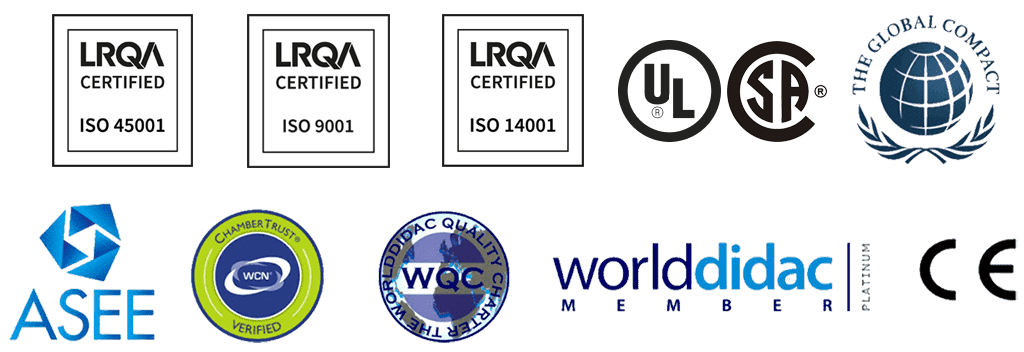
KUNDENDIENST

 Cookie-Präferenzen
Cookie-Präferenzen

